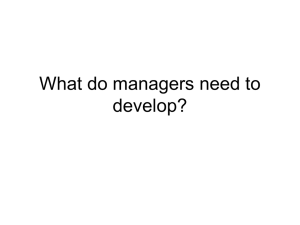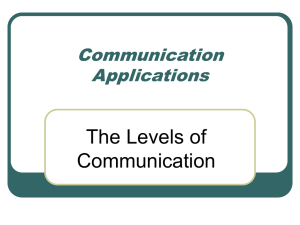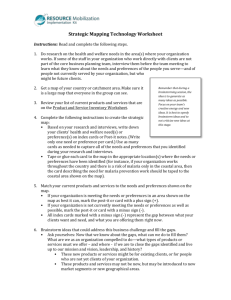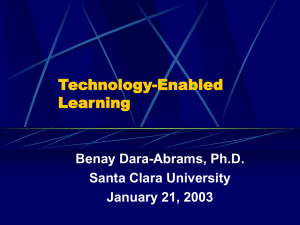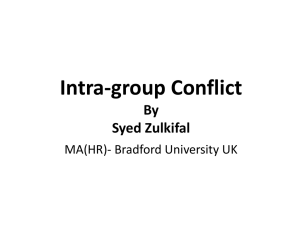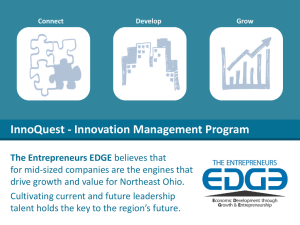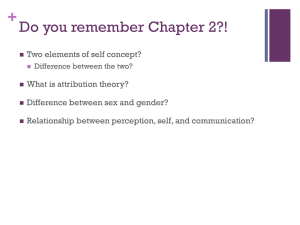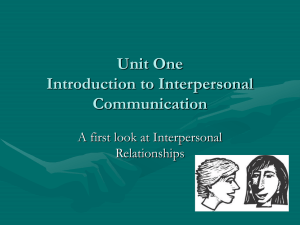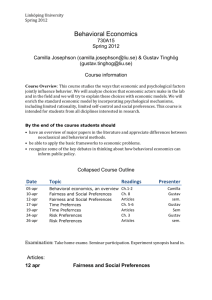Conflict Management Lecture 03
advertisement
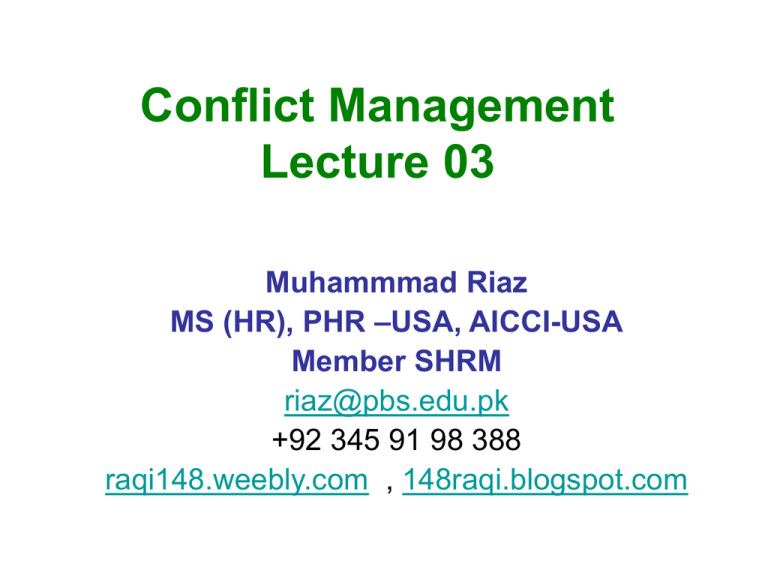
Conflict Management Lecture 03 Muhammmad Riaz MS (HR), PHR –USA, AICCI-USA Member SHRM riaz@pbs.edu.pk +92 345 91 98 388 raqi148.weebly.com , 148raqi.blogspot.com Conflict An interactive process manifested in incompatibility, disagreement, or dissonance within or between social entities (i.e. individual, group, organization). Conflict occurs when one or (two) social entity (ies): is required to engage in an activity that is dissimilar with his or her needs or interests. Holds behavioral preferences, the satisfaction of which incompatible with another person’s or her preferences is implementation of his Wants some mutually desirable resource that is in supply, such that the wants of everyone may not satisfied fully short be Possesses attitudes, values, skills, and goals that are salient in directing one’s behavior but that are perceived to be exclusive of the attitudes, values, skills, and goals held by the other(s) Has partially exclusive behavioral preferences regarding joint actions; and is interdependent in the performance of functions or activities. Why Workplace Conflict?? Workplace conflict may be because of scarce and insufficient resources; such as time, status or budgets: because of values; such as political preferences, religious beliefs, deep rooted moral values: because of insights, facts, perceptions, world views and may be because of any possible combination of these issues Types of Conflict 1. Affective Conflict / Relationship Conflict 2. Substantive Conflict / Task Conflict 3. Conflict of Interest / Clash of Interests 4. Conflict of Values 1. Affective Conflict / Relationship Conflict This occurs when two interacting social entities, while trying to solve a problem together, become aware that their feelings and emotions regarding some or all the issues are incompatible. Psychological conflict Relationship conflict Emotional conflict Interpersonal conflict 2. Substantive Conflict / Task Conflict This occurs when two or more organizational members disagree on their task or content issues. Task conflict Cognitive conflict Issue conflict 3. Conflict of Interest / Clash of Interests This type of conflict occurs “when each party, sharing the same understanding of the situation, prefers a different and Some -what incompatible solution to a problem involving either a distribution of scarce resources between them or a decision to share the work of solving it” The argument of managers A and B for the same General Manager’s job exemplifies a conflict of interest. 4. Conflict of Values This occurs when two social entities differ in their values or ideologies on certain issues Ideological conflict The ideological disagreement of supervisors A and B on the question of “compensatory hiring” is an example of value conflict. Levels of Conflict Intrapersonal Conflict - Within one’s personality Interpersonal Conflict - Among persons Intra-group Conflict - With in group Inter-group Conflict - Among persons Intrapersonal Conflict • This type of conflict is also known as intraindividual or intra-psychic conflict. • It occurs when an organizational member is required to perform certain tasks and roles that do not match his or her expertise, interests, goals, and values. Interpersonal Conflict • This is also known as dyadic conflict. • It refers to conflict between two or more organizational members of the same or different hierarchical levels or units. • The studies on superior–subordinate conflict relate to this type of conflict. Intra-group Conflict • This is also known as intradepartmental conflict. • It refers to conflict among members of a group or between two or more subgroups within a group in connection with its goals, tasks, procedures, and so on. Such a conflict may also occur as a result of incompatibilities or disagreements between some or all the members of a group and its leader(s). Inter-group Conflict • This is also known as interdepartmental conflict. It refers to conflict between two or more units or groups within an organization. • Conflicts between line and staff, production and marketing, and headquarters and field staffs are examples of this type of conflict. • On special type of inte-rgroup conflict is between labor and management. Main Researchers • Dr. Dean Tjosvold Dr. Afzal Rahim 400+ Research Articles Book Chapters Management Department Professor of Management Lingnan University Tuen Mun, Hong Kong Fax: (852) 2467-0982 email: tjosvold@ln.edu.hk Western Kentucky University Bowling Green, KY Two Books Book Chapters, 200+ Researches Phone/Fax: 270-782-2898/2601 email: mgt2000@aol.com
